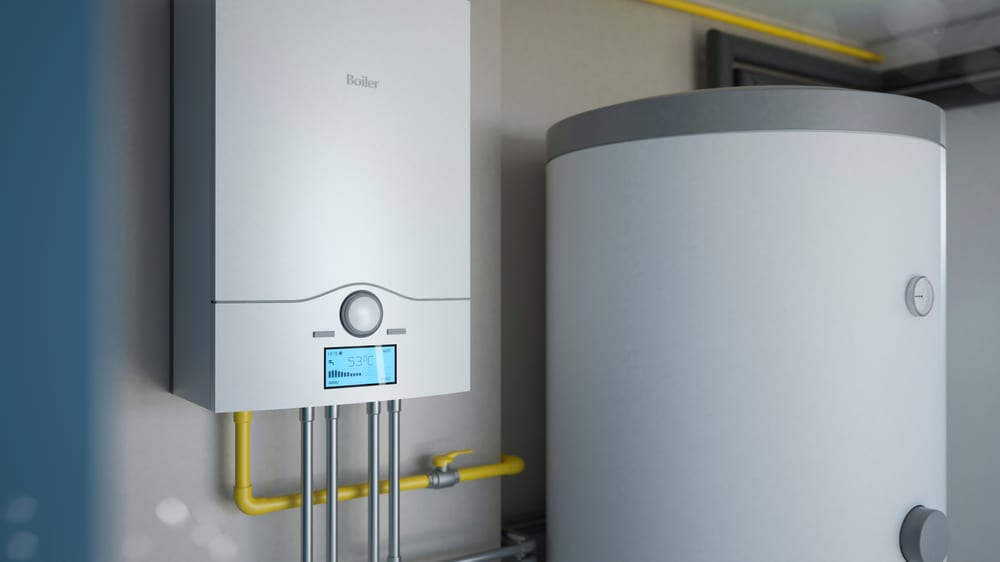As a resident of Champaign, IL, your home likely has a boiler down in the basement that you don’t think about much until it stops operating correctly. As a vital piece of your home’s central heating system, it’s helpful to know how your boiler works so that you can maintain it throughout the year.
If any issues arise with your boiler, you will have a better sense of explaining to the HVAC technician who comes to your home what the concern is. And when the time comes for a boiler replacement, you can make an informed decision.
How Boilers Work
Regardless of which type of boiler your home has, the basic setup is the same. The boiler uses a fuel source to produce heat, often in the form of hot water or air. The boiler then circulates the heat to various parts of your home using a series of pipes and endpoints, usually either vents or radiators.
Boilers that use hot water as the heat source can double as water heaters, making them a wise choice if your appliance space is limited. Some boilers will have a lower upfront cost for purchasing and installation but may cost more in the long run based on energy use. Others may be more expensive to buy or install but will lower your energy bills and save you money over time.
Types of Boilers
The first thing to understand about your boiler is which type you have in your home.
Steam Boiler
A steam boiler uses pressure and gravity to create hot steam that gets sent through the radiator pipes of your home. As the water condenses and cools down, it makes its way back into the boiler to complete the cycle again.
Hot Water Boiler
Hot water boilers work similarly to steam boilers in that they use heated water (around 140°F) to warm your home. The water is heated by either a gas or oil burner and then pumped throughout the system.
Electric Boiler
Electric boilers are connected to your electrical system to obtain the energy needed to heat your home, making them more environmentally friendly than most other options on the list. However, electric boilers cost more to operate as electricity is pricier than alternatives such as oil and gas.
Oil Boiler
Common in rural settings, oil boilers heat water or air and radiate it throughout the house by using oil as their fuel source. The oil is stored in a separate tank.
Gas Boiler
Houses with easy access to gas lines can utilize a natural gas boiler, or those out in the country can use propane tanks. The natural gas keeps the boiler’s pilot light going so that the heat coils can distribute warmth.
Biomass Boiler
A newer option on the market, biomass boilers burn eco-friendly byproducts and are very energy efficient. They are easy to install in homes and can help with lowering energy bills and taking advantage of renewable energy sources.
Boiler Installation
Whether it’s in a brand new home or an older construction, it’s best to have a professional HVAC company complete your boiler installation. These appliances need extra care and skill to install as they use potentially dangerous substances such as natural gas, fire, electricity, and steam. A boiler that’s poorly installed can create a huge risk for you and your family members.
An HVAC technician can also help you with retrofitting your boiler to make it more energy-efficient and safety-compliant. Retrofitting can include options such as digital thermostats, zone control, and upgraded ductwork. Not all boilers can be retrofitted, but it’s worth looking into if your boiler still has some years left on it.
If your Champaign, IL, home needs boiler installation, Castle Home Comfort Heating & Cooling can inform you of your options and help you determine the best boiler for your home’s needs. All of our technicians are trained and certified to complete the job correctly the first time.
Boiler Maintenance
While boiler installation is best left to the professionals, there is a fair amount of boiler maintenance and checking that you can complete on your own. For starters, it’s beneficial to keep an eye out for any leaks around the boiler. You can also make sure the area around your boiler is well-ventilated and does not contain any obstructions like boxes or furniture.
It’s also a good idea to listen to your boiler and get a sense of its familiar sounds. All boilers will make noises, but knowing your boiler’s specific sounds will help you know when something is off. If you start hearing strange clanks or vibrations that you overlooked in the past, it’s probably a sign that something needs checking.
If your boiler has a pilot light or flame, note what color it usually is when operating. Any changes in color to the pilot light indicate something is off, and an HVAC technician should check it.
Another valuable skill to acquire related to your boiler is understanding how your thermostat works and using it to its full potential. Not only can this save you on your energy bills by being more efficient, but it will also allow you to run some checks if something seems off. More modern thermostats provide error messages or warnings to assist you in determining how to proceed.
Doing some essential maintenance throughout the year on your boiler is worthwhile, but it’s still necessary to schedule maintenance every year with a professional. Specialists will know the inner workings of your appliance and can ensure there are no issues that could have slipped past you.
Boiler Repair
Whenever you think something about your boiler isn’t right, give Castle Home Comfort Heating & Cooling a call. We’ll send out an experienced technician who will pinpoint the issue and offer a solution.
Here are some of the most common boiler repairs we perform for our clients:
- Kettling noises: caused by a build-up of deposits in the pipes
- Leaking/dripping: occurs when parts rust or seals are bad
- Irregular heating: usually happens if parts need replacement
- Pilot light issues: thermocouple acts up, or gas doesn’t reach the boiler
- Faulty thermostat: loose wires, inaccurate settings, or other malfunction
All of the above issues should be checked out by professionals to ensure your system is safe. A boiler may look like a simple appliance from the outside, but things can become complicated quickly. Rather than causing other damage or needing more extensive repairs, contact Castle Home Comfort Heating & Cooling to have a look.
Boiler Replacement
Sometimes even professional repairs won’t cut it, and the best course of action is to get a boiler replacement. While lifespans vary by type and use, most boilers are dependable for 15 to 20 years, with some lasting 30 years or more.
If your boiler needs constant repairs, has erratic performance, or is past its prime, it may be time to consider a boiler replacement. Also, replacing your older boiler with a newer, more eco-friendly model can help you cut annual costs. It may also be an opportunity to combine your boiler and water heater into one highly efficient unit.
Champaign, IL Trusts Castle Home Comfort
Anytime an HVAC technician from Castle Home Comfort Heating & Cooling comes to your home, they will always be upfront and honest with you. With their knowledge and experience, they can perform boiler maintenance, diagnose any issues, and give their opinion when it’s time for a boiler replacement.
Feel free to reach Castle Home Comfort Heating & Cooling via our website or by giving us a call. We’ll schedule an appointment that’s convenient for you and ensure your 100% satisfaction!

